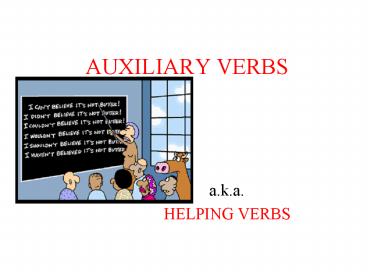AUXILIARY VERBS - PowerPoint PPT Presentation
1 / 15
Title:
AUXILIARY VERBS
Description:
... up of a main verb and one or more auxiliary (helping) verbs. The main verb is always the last ... A VERB PHRASE may be used to express. The tense of a verb. ... – PowerPoint PPT presentation
Number of Views:6319
Avg rating:3.0/5.0
Title: AUXILIARY VERBS
1
AUXILIARY VERBS
- a.k.a.
- HELPING VERBS
2
Auxiliary verbs are combined with other verbs to
make
- VERB PHRASES
3
A VERB PHRASE
- Is made up of two or more verbs
- Is made up of a main verb and one or more
auxiliary (helping) verbs - The main verb is always the last word in the
phrase - The auxiliary (helping) verb(s) always comes
before the main verb.
4
For example
- Our plane was delayed for two hours.
- (wasauxiliary verb delayedmain verb)
- The driver may have been injured.
- (may have beenauxiliary verb injuredmain verb)
- You should be considerate at all times.
- (shouldauxiliary verb bemain verb)
- (Remember - if a word cannot be used as a verb
it cannot be part of the verb phrase.)
5
A VERB PHRASE may be used to express
- The tense of a verb.
- The stadium will be filled to capacity.(future)
- That the action is directed at the subject.
- We should save a seat for Jeff.(We)
6
COMMON AUXILIARY VERBS
be are been will might have have had would
am was being may could has had been does
is were shall can should do Has been did
7
Some auxiliary verbs can also be used as main
verbs.
- Alice has a new car. (main verb)
- Alice has driven her new car only once this
winter. (hasauxiliary verb) (drivenmain
verb)
8
A verb phrase may be interrupted by other words.
- Jack has always liked math. (hasauxiliary
verb likedmain verb) - You should not leave the milk on the counter.
(shouldauxiliary verb
leavemain verb)
9
PRACTICE MAKES PERFECT!
10
Write the auxiliary verb or verbs for each
sentence .
- The thief had stolen the bike.
- Frank must have seen the accident happen.
- I will leave on Saturday.
- He should be ready by 400.
- Their father has traveled to Europe many times.
- Oscar has always been my favorite uncle.
11
The auxiliary verbs are in red.
- The thief had stolen the bike.
- Frank must have seen the accident happen.
- I will leave on Saturday.
- He should be ready by 400.
- Their father has traveled to Europe many times.
- Oscar has always been my favorite uncle.
12
Now, write the main verb for each sentence.
- The thief had stolen the bike.
- Frank must have seen the accident happen.
- I will leave on Saturday.
- He should be ready by 400.
- Their father has traveled to Europe many times.
- Oscar has always been my favorite uncle.
13
The main verbs are in purple.
- The thief had stolen the bike.
- Frank must have seen the accident happen.
- I will leave on Saturday.
- He should be ready by 400.
- Their father has traveled to Europe many times.
- Oscar has always been my favorite uncle.
14
Finally, write the entire verb phrase for each
sentence.
- The thief had stolen the bike.
- Frank must have seen the accident happen.
- I will leave on Saturday.
- He should be ready by 400.
- Their father has traveled to Europe many times.
- Oscar has always been my favorite uncle.
15
The verb phrase is in green.
- The thief had stolen the bike.
- Frank must have seen the accident happen.
- I will leave on Saturday.
- He should be ready by 400.
- Their father has traveled to Europe many times.
- Oscar has always been my favorite uncle.































